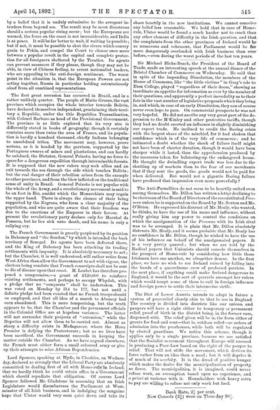The French Government is greatly perplexed by its position in
Dahomey and "the Soudan," by which is intended the back territory of Senegal. Its agents have been defeated there, and the King of Dahomey has been attacking its trading settlements with impunity. It is absolutely necessary to act ; but the Chamber, it is well understood, will rather retire from West Africa than allow the Government to act with vigour, the electors being resolute that French conscripts shall not be sent to die of disease upon that coast. M. Loubet has therefore pro- posed a compromise,—a grant of £120,000 to reinforce existing settlements, and perhaps to occupy Whydah, with a pledge that no " conquests " shall be undertaken. This was voted on Monday by 314 to 177, but not until a definite pledge had been exacted that no French troops should oe employed, and that all idea of a march to Abomey had oeen abandoned. This is mere temporising, but the truth appears to be, that the Chamber and the permanent officials in the Colonial Office are at hopeless variance. The latter will not surrender their projects of "extension," -while the Deputies will not allow them to be carried out. Almost as sharp a difficulty exists in Madagascar, where the nova Premier is defying the Protectorate ; but as no lives have been sacrificed, the Government succeeds in keeping the matter outside the Chamber. As we have argued elsewhere, the French must either form a small coloured army or give up their attempts to seize African Dependencies.
































 Previous page
Previous page